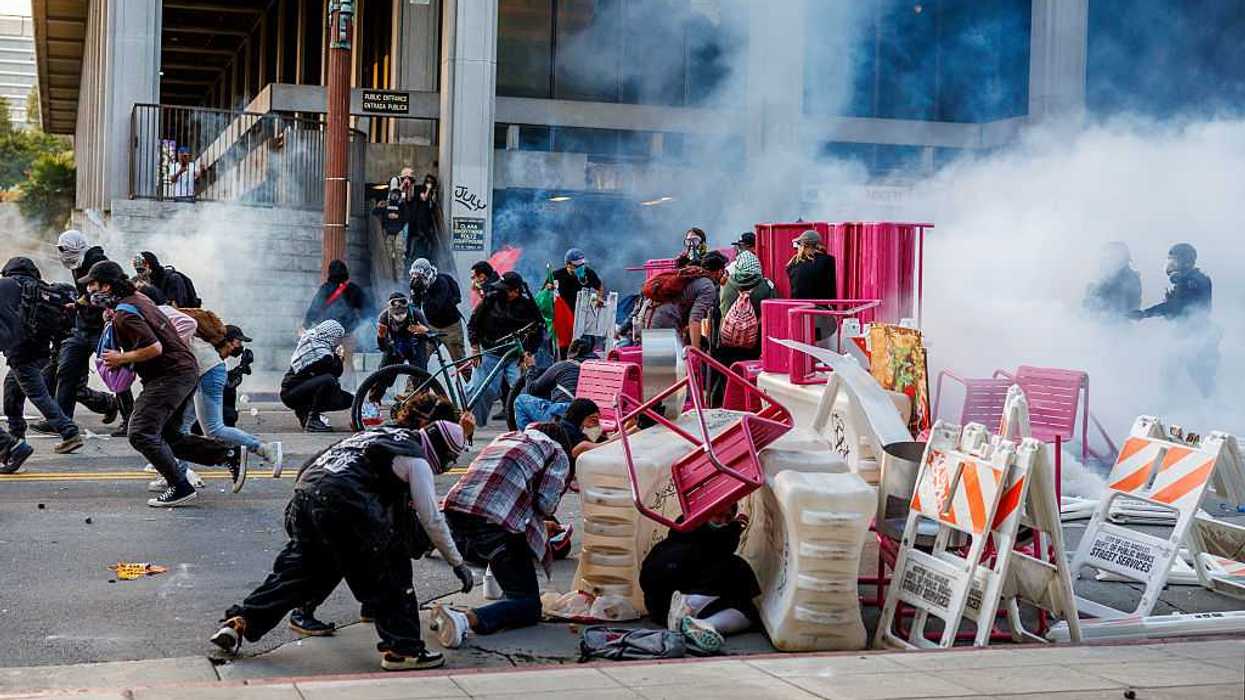
© 2026 Blaze Media LLC. All rights reserved.
Round 2: Mich. Gov. Signs Legislation Taking on Union Contract Agreements, Collective Bargaining
December 29, 2012
"Simply put, Gov. Snyder has taken another major step toward breaking organized labor’s power over the state." -- "... it's a dictator's law!"
 Gov.-elect Rick Snyder, right, and Supreme Court justice-elect Mary Beth Kelly wave at supporters at the GOP party in Detroit on Nov. 2. Michigan has suffered from a double-digit unemployment rate since November of 2008. (Carlos Osorio /AP)
Gov.-elect Rick Snyder, right, and Supreme Court justice-elect Mary Beth Kelly wave at supporters at the GOP party in Detroit on Nov. 2. Michigan has suffered from a double-digit unemployment rate since November of 2008. (Carlos Osorio /AP)
Gov. Rick Snyder put a new emergency manager law on the books in Michigan on Thursday, weeks after voters repealed a version that gave sweeping powers to a single person to overhaul financially distressed communities.
"These new laws recognize the vital importance of financially stable, economically vibrant communities to Michigan's future," Gov. Snyder, a Republican, said in a statement.
"They also respect the needs of citizens and taxpayers by delivering greater oversight and efficiency. Our reinvention of government is delivering meaningful reforms that will keep Michigan on the path to prosperity," the statement adds.
The new law, passed by the Michigan Legislature, will give local governments and ailing school districts the opportunity to choose their own remedy. If a review team finds that a financial emergency exists, those communities can request an emergency manager, ask for a mediator, file for bankruptcy or introduce a reform plan with the state.
 Michigan Gov. Rick Snyder. (Office of the Governor of MI)
Michigan Gov. Rick Snyder. (Office of the Governor of MI)
Furthermore, under the new law, emergency managers would have the power to throw out, modify, or terminate labor union agreements, according to The Detroit News. Collective bargaining could also be suspended for up to five years.
“Cities and school district governing boards could remove the emergency manager after one year by a two-thirds vote,” the report adds. “After an emergency manager leaves, local officials would be barred from altering the manager's spending plans, labor contracts and ordinances for two years.”
Simply put, Gov. Snyder has taken another major step toward breaking organized labor’s power over the state.
"We listened to the voters and we wanted to make sure that the local communities were more empowered," said House Speaker Jase Bolger (R-Mich.) in an interview with The Detroit News.
"You can eliminate the emergency financial situation. … You can't pretend that's not there," the speaker adds.
The law won't take effect in until late March. Under the old law, the power to send an emergency manager rested solely with the governor. It was a threat to labor unions because managers had the power to throw out contracts.
 Union members from around the country rally at the Michigan State Capitol to protest a vote on Right-to-Work legislation December 11, 2012 in Lansing, Michigan. (Photo by Bill Pugliano/Getty Images)
Union members from around the country rally at the Michigan State Capitol to protest a vote on Right-to-Work legislation December 11, 2012 in Lansing, Michigan. (Photo by Bill Pugliano/Getty Images)
Under the new law, a manager still would have the power to change contracts. But local officials also have the option to develop an alternative plan if it saves the same amount of money as the manager's proposals. Local governments can remove a manager after one year with a two-thirds vote of its elected officials.
The philosophy behind the law is that troubled local governments may lack the political consensus needed to get back on track or they simply need expertise to get past their financial problems.
The new law includes a $770,000 state appropriation to cover managers' salaries, a provision that would shield it from another statewide vote because spending bills are immune to referendums.
Managers are working now in Benton Harbor, Ecorse, Flint, Pontiac and Allen Park, as well as in the Muskegon Heights, Highland Park and Detroit school districts.
And you better believe organized labor and public school officials aren’t happy with the new law.
 Thousands of union members from around the state gather at the State Capitol to protest Michigan Republican Gov. Rick Snyder's proposed budget cuts April 13, 2011 in Lansing, Michigan. (April 12, 2011: Getty Images North America)
Thousands of union members from around the state gather at the State Capitol to protest Michigan Republican Gov. Rick Snyder's proposed budget cuts April 13, 2011 in Lansing, Michigan. (April 12, 2011: Getty Images North America)
President of the Detroit Public School board LaMar Lemmons called Gov. Snyder's decision "a travesty of justice."
"The people voted to repeal it, and for the governor to sign it is a blatant contradiction of the will of the people," Lemmons said Thursday.
"For the past four consecutive years, we've had some form of emergency manager and it's not working. What we have is taxation without representation. We have an appointed dictator over the district contrary to the will of the people," he added.
Ray Holman, a lobbyist for a UAW local that represents 17,000 state workers, gathered signatures to get a repeal of the old law on the ballot. He said the new law is "only slightly better" and predicted critics would explore a legal challenge.
"It's the exact same law with window dressing. Ultimately, it's a dictator's law [emphasis added]," Holman said. "It's disingenuous to say Gov. Snyder listened to the people. He's flat-out wrong."
Follow Becket Adams (@BecketAdams) on Twitter
The AP contributed to this report. Featured image courtesy Getty Images.
Want to leave a tip?
We answer to you. Help keep our content free of advertisers and big tech censorship by leaving a tip today.
Want to join the conversation?
Already a subscriber?
more stories
Sign up for the Blaze newsletter
By signing up, you agree to our Privacy Policy and Terms of Use, and agree to receive content that may sometimes include advertisements. You may opt out at any time.
Related Content
© 2026 Blaze Media LLC. All rights reserved.
Get the stories that matter most delivered directly to your inbox.
By signing up, you agree to our Privacy Policy and Terms of Use, and agree to receive content that may sometimes include advertisements. You may opt out at any time.






